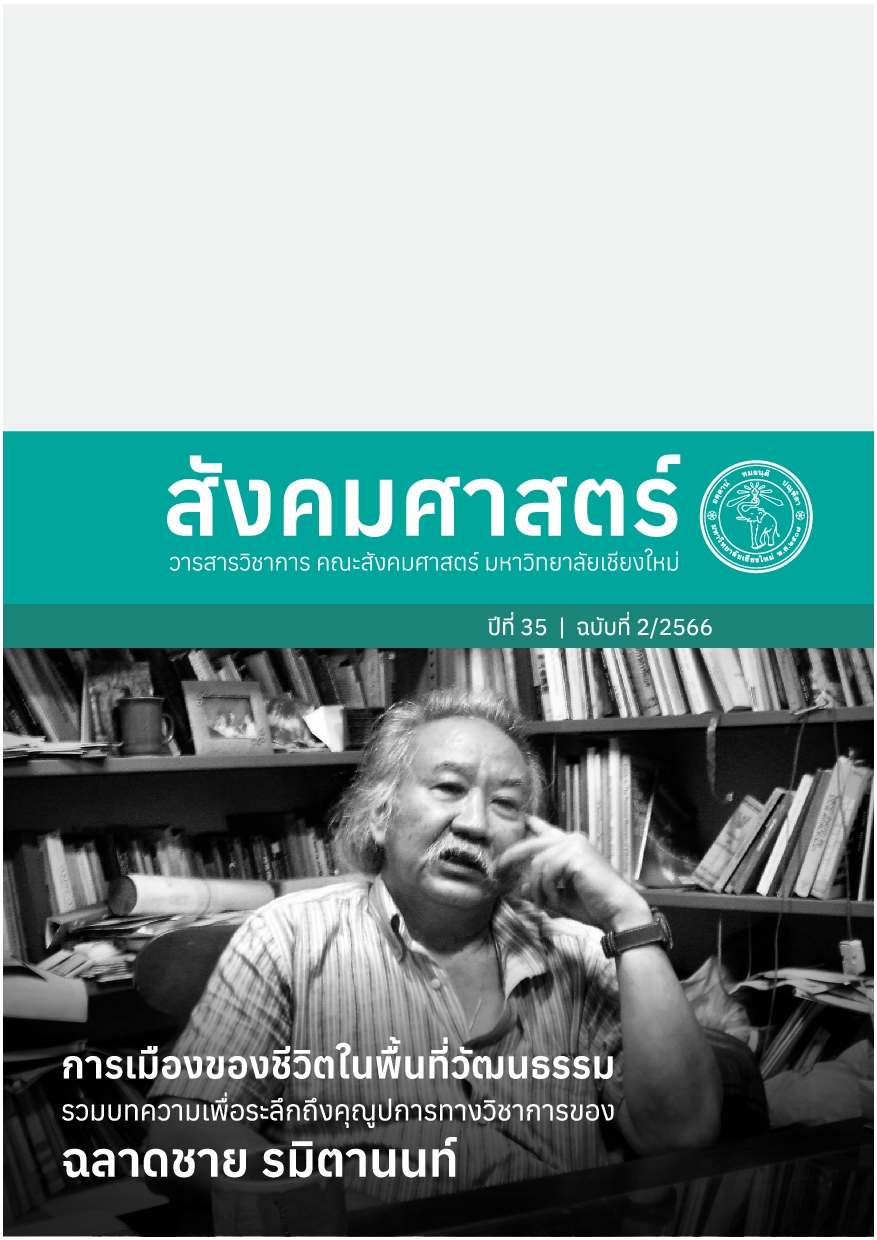From Social Forestry to Communal Land Title: Evolution and Challenges of Community Rights in Forest and Land Management Concept
Main Article Content
Abstract
The community rights in resource management concept has been advocated for more than three decades in Thailand, mainly through the struggles of forest-dwelling communities and those in land-related conflicts with the state. Although community rights have been enshrined in the constitution since 1997, there is limited progress in enforcing and entrenching the concept. This article traces the evolution of the idea of community rights from both an ideological and social movement strategic perspectives, from the concept of social forests and community forests to the concept of community rights and communal land title. The article reviews the challenges the concept of community rights faced over the past three decades. It argues that the advocacy of community rights concepts based on pre-existing cultural traditions in the management of resources of the community may not be able to respond to community dynamics and the diverse needs of different communities
Article Details

This work is licensed under a Creative Commons Attribution-NonCommercial-NoDerivatives 4.0 International License.
All written articles published on Journal of Social Sciences is its author’s opinion which is not belonged to Faculty of Social Sciences, Chiang Mai University or is not in a responsibility of the journal’s editorial committee’s members.
References
กรมป่าไม้, บก. 2542. ชีวิตและงานอนุรักษ์ทรัพยากรป่าไม้ของนาย ไพโรจน์ สุวรรณกร อธิบดีกรมป่าไม้ (พ.ศ. 2532-2534). กรุงเทพฯ: กรมป่าไม้.
กรมอุทยานแห่งชาติ สัตว์ป่า และพันธุ์พืช. 2566. “สรุปรายงานการกระทำผิดกฎหมายเกี่ยวกับการป่าไม้ ของหน่วยงานในสังกัดกระทรวงอุทยานแห่งชาติ สัตว์ป่า และพันธุ์พืช ปีงบประมาณ 2556-2566.” สืบค้นเมื่อ 1 เมษายน 2566. https://portal.dnp.go.th/DNP/FileSystem/download?uuid=02ef82d8-16f5-4d36-974f-de6ac9d6bd14.pdf.
กลุ่มศึกษาการพัฒนาทางเลือก. 2533. “ทิศทางการพัฒนาประเทศ: ทัศนะ ประชาชนและองค์กรพัฒนาเอกชน.” ใน บทบาทประชาชนและเอ็นจีโอในการพัฒนาประเทศ. กรุงเทพฯ: จุฬาลงกรณ์มหาวิทยาลัย.
คณะกรรมการแก้ไขปัญหาสหพันธ์เกษตรกรภาคเหนือ และเครือข่ายองค์กรประชาชนภาคเหนือ. 2544. สรุปผลการศึกษาและแนวทางแก้ไขปัญหา กรณีปัญหาของสหพันธ์เกษตรกรภาคเหนือและเครือข่าย องค์กรประชาชนภาคเหนือ. เชียงใหม่: สหพันธ์เกษตรกรภาคเหนือ.
ฉลาดชาย รมิตานนท์. 2528. ป่าไม้สังคมเพื่อการพัฒนาชนบท. กรุงเทพฯ: สมาคมสังคมศาสตร์แห่งประเทศไทย.
ฉลาดชาย รมิตานนท์, อานันท์ กาญจนพันธุ์, และสัณฐิตา กาญจนพันธุ์. 2536. ป่าชุมชนภาคเหนือ. กรุงเทพฯ: สถาบันชุมชนท้องถิ่นพัฒนา.
ธีระพรรณ ใจมั่น. 2542. “การผลักดันนโยบายโดยการมีส่วนร่วมของประชาชน : ศึกษาเฉพาะกรณีร่างพระราชบัญญัติป่าชุมชน.” วิทยานิพนธ์รัฐศาสตรมหาบัณฑิต มหาวิทยาลัยธรรมศาสตร์ กรุงเทพฯ.
พีระ ศรีเมือง. 2546. “ประสบการณ์การทำงานของพีระ ศรีเมือง.” ใน เปลือยประสบการณ์เอ็นจีโอด้านป่าและทรัพยากร, บรรณาธิการโดย เพิ่มศักดิ์ มกราภิรมย์. กรุงเทพฯ: โครงการจัดการทรัพยากรภาคตะวันออกเฉียงเหนือ.
วิทยา อาภรณ์. 2557. “แนวทางโฉนดชุมชนกับการสร้างความมั่นคงในชีวิตของเกษตรกรภาคใต้.” วารสารสังคมวิทยามานุษยวิทยา 33 (1): 105-139.
สนั่น ชูสกุล, บก. 2549. 3 ทศวรรษแนวคิดวัฒนธรรมชุมชน: บทนิพนธ์คัดสรรว่าด้วยประชาธิปไตย ชาวบ้าน เศรษฐกิจชุมชน และการพัฒนาบนเส้นทางที่เป็นไท เนื่องในวาระครบรอบ 60 ปี บำรุง บุญปัญญา. สุรินทร์: โครงการหนังสือดอกติ้วป่า.
สมัชชาคนจน. 2544. ข้อเสนอสมัชชาคนจนต่อนายกรัฐมนตรีและคณะรัฐบาล ดร.ทักษิณ ชินวัตร กุมภาพันธ์ 2544 (ฉบับสมบูรณ์). กรุงเทพฯ: สมัชชาคนจน.
สำนักงานโฉนดชุมชน. 2565. “ข้อมูลชุมชนที่ได้รับความเห็นชอบให้ดำเนินงานโฉนดชุมชนจำนวน 55 ชุมชน.” สืบค้นเมื่อ 23 ธันวาคม 2565. https://www.opm.go.th/opmportal/multimedia/thamroch/ชุมชนที่เห็นชอบ%2055%20ชุมชน.pdf.
เสน่ห์ จามริก. 2549. สิทธิมนุษยชนไทยในกระแสโลก. กรุงเทพฯ: สำนักงานกองทุนสนับสนุนงานวิจัย.
เสน่ห์ จามริก และยศ สันตสมบัติ, บก. 2536ก. ป่าชุมชน ในประเทศไทย: แนวทางการพัฒนา, เล่ม 1 ป่าฝนเขตร้อนกับภาพรวมของป่าชุมชนในประเทศไทย. กรุงเทพฯ: สถาบันชุมชนท้องถิ่นพัฒนา.
เสน่ห์ จามริก และยศ สันตสมบัติ, บก. 2536ข. ป่าชุมชนในภาคตะวันออกเฉียงเหนือ. กรุงเทพฯ: สถาบันชุมชนท้องถิ่นพัฒนา.
เสน่ห์ จามริก และยศ สันตสมบัติ, บก. 2536ค. ป่าชุมชนในภาคเหนือ. กรุงเทพฯ: สถาบันชุมชนท้องถิ่นพัฒนา.
อานันท์ กาญจนพันธุ์. 2543. “สถานภาพการวิจัยชุมชนกับการจัดการทรัพยากร: บทสังเคราะห์ผลของการศึกษา.” ใน พลวัตของชุมชนในการจัดการทรัพยากร:กระบวนทัศน์และนโยบาย, บรรณาธิการโดย อานันท์ กาญจนพันธ์. กรุงเทพฯ: สำนักงานกองทุนสนับสนุนงานวิจัย.
Atchara Rukyutidharm. 2009. “Constructing the Meanings of Land Resource and a Community in the Context of Globalization.” PhD thesis, Chiang Mai University, Chiang Mai.
Bencharat Sae Chua. 2014. “Redefining Citizenship: The community forest movement in Thailand and strategic rights claims.” PhD thesis, La Trobe University, Australia.
Escobar, Arturo. 1998. “Whose Knowledge, Whose Nature?: Biodiversity, conservation, and the political ecology of social movements.” Journal of political ecology 5 (1): 53-82.
Ostrom, Elinor. 1990. Governing the Commons: The evolution of institutions for collective action. Cambridge University Press, Cambridge.
Richardson, Benjamin J. 2009. “The Ties that Bind: Indigenous peoples and environmental governance.” In Indigenous Peoples and the Law: Comparative and critical perspectives, edited by Benjamin J. Richardson, Shin Imai, and Kent Mcneil. Portland: Hart Publishing.
Tyler, Stephen R. 2006. “Community-based Natural Resource Management: A research approach to rural poverty and environmental degradation.” In Communities, Livelihoods and Natural Resources: Action research and policy change in Asia, edited by Stephen R. Tyler. Ottawa: International Development Research Centre.
Vandergeest, Peter. 1996. “Property Rights in Protected Areas: Obstacles to community involvement as a solution in Thailand.” Environmental Conservation 23 (3): 259-268.
Vandergeest, Peter, and Nancy Lee Peluso. 1995. “Territorialization and State Power in Thailand.” Theory and Society 24 (3): 385-426.
Walker, Andrew. 2004. “Seeing Farmers for the Trees: Community forestry and the arborealisation of agriculture in northern Thailand.” Asia Pacific Viewpoint 45 (3): 311-324.
Walker, Andrew, and Nicholas Farrelly. 2008. “Northern Thailand's Specter of Eviction.” Critical Asian Studies 40 (3): 373-397.


